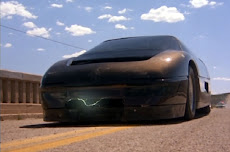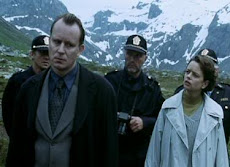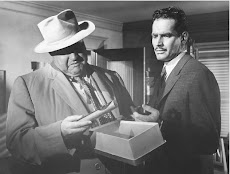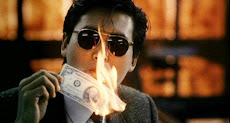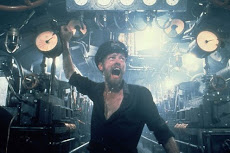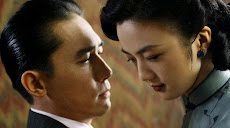In the past, too often I danced around the question "What's your favorite movie?" I think I was trying to sound clever by refusing to answer. I'd usually launch into a long speech about
Fellini,
Kurosawa,
Kubrick,
Hitchcock, and sprinkle in a few moderns like
Kar Wai Wong and
Ridley Scott so as not to sound like an old fart. By the time I was through, I'd have named about 20
films, 19 of which the average questioner had not seen, and all 19 of which he or she would not likely remember. Not only was such snobbery, well, snobbish, it was also a lie.
My favorite film is Blade Runner.

Oh, to dwell among a class of internet fanboys and girls so large it's practically bourgeoisie! Well, if what's popular is seldom beautiful, that does not mean it never is.
And, indeed, while Blade Runner has gained a lot of ground (well beyond mere cult following) since 1982, there's still plenty of people out there who haven't seen it. Nay, experienced it. When it came time for my yearly viewing (a right only matched by Rear Window), I decided to devote a post to it. Last year is nearly impossible to top: I had three friends over, none of whom had seen the film, a brand new copy of the Final Cut DVD (only a few months old at that point), and an '84 Bordeaux which is, incidentally, the year I was born. (No, '84 was not a legendary year, for Bordeaux, but drinking wine that old is never not fun. Unless it's turned to vinegar.) How could I top this? An '82 something (the year of BR's original release), one special lady who hasn't seen it, a Blu-Ray copy, and some serious making out afterward would probably do it. Seeing as I'm a guy who's blogging about Blade Runner, this will probably require an Act of God. Here's praying.
No, this year is all yours, you who read this. Fans will nod and hopefully appreciate my insights, which are available at least 442 other places on the World Wide Web in all written languages. But maybe, just maybe, someone will read this who has not yet seen this masterpiece. Likely this person has heard of Blade Runner before and has told him or herself that they've really got to get around to it. Perhaps it's on the Netflix or Blockbuster queue, but keeps getting bumped for recents like There Will Be Blood or, heaven forbid, Doomsday. Finally, after reading my words, should this person will act, it will have all been worth it.
But, please, don't stop there: see it. Don't ask about it, don't talk about it, just let it set for awhile. A few months or maybe a year later, watch it again. Everyone's heard that about a movie before, but trust me, this is the one. Once is never enough. This was probably my 70th viewing.NOTE: Those concerned about spoilers should avoid the sections on "The Themes" and "The Confusion."
The Visuals:
 I rest my case.
I rest my case.
Even those who can't stand Blade Runner (and there are some) appreciate that it's a visual milestone. Even today, amped up to the highest possible Blue-Ray resolution, despite the technological limitations of the early 80's, it's gorgeous. Today it's computers and green screens, but for some reason I savor the production value of sets, modelwork and matte paintings. Computer animation has come a long way, and it's certainly more cost effective, but I daresay it still does not live up to the work done on Blade Runner (or even 2001, but that's another post). This just looks real.
I'm the last person to let a shoddy movie get a pass because it looks perfect (this is why I can't recommend either of Terrence Malick's most recent films), but this comes close. And, fortunately, it has far more to offer.
The Music:
Vangelis, king of the synthesizer. While the instrument is quintessentially 80's, this is not Flock of Seagulls. Like Vangelis's most famous score, Chariots of Fire (which takes place in 1924), Blade Runner's score transcends the time of its production. Combined with the visual style of Blade Runner, one hears exactly what one sees. This is the only score I have on CD. The Story:Los Angeles, November 2019: Rick Deckard is a blade runner who's quit the police force. Blade runners track down and terminate renegade replicants--genetically engineered beings--which are illegal on Earth. Deckard is divorced and has a drinking problem. It's never explained why Deckard quit, got divorced or developed said drinking problem (or whether it occurred in that order), but it's likely his conscience started to bother him as Replicants became more and more human. Replicants are not machines: if you prick them, they bleed.
Roy Batty, Leon, Pris and Zhora are a band of replicants that escape to earth from off-world colonies. They're all the most advanced model, Nexus-6. Replicants are faster, stronger, and often more intelligent than the average human, but lack human emotions (they presumably begin their lives as adults). To prevent them from developing their own emotions, replicants are designed to live only four years. While emotionally undeveloped, this band of replicants is angry with this situation and seeks out a cure to their "accelerated decrepitude" from their manufacturer the Tyrell Corporation, headed by Dr. Eldon Tyrell.
After blade runner David Holden is nearly killed by Leon, Deckard is brought back to the force to track down and "retire" these Replicants. Along the way, he meets and falls in love with a special Nexus-6 replicant, Rachael, who has artificial memories which give her more human emotions. Deckard performs most of his duties, however sloppily, and ends up at the mercy of Roy Batty in a very dramatic climax.
The Themes:
A simple enough plot (made moreso by thousands of immitators) opens a can of worms, or more like a cupboard full of cans of worms. As science advances and cloning becomes a reality, the ethical dilemmas of Blade Runner continue to ripen: who is man to create intelligent life? Is such life artificial? Is such life inferior? Is such, life? Does man thereby destroy God? Does man become God? Will God allow this to happen?
Rick Deckard is quintessential anti-hero of the future: He believes what he's doing is wrong, but does it anyway while numbing his mind and body with Johnnie Walker and a variety of other hard liquors. While seemingly reflective, he mechanically draws his blaster upon sight of a "skin job." He's not very sporting about it, either. He falls for Rachael, but her reluctance leads to what would probably amount to rape if Rachael were human. And while the Replicants are a deadly, evil band ready to kill to extend their own lifespans, who put them in this situation?

"Quite an experience to live in fear, isn't it? That's what it is to be a slave."
The most important twist is that Deckard's redemption--or at least his chance at it--is made possible by the redemption of Roy Batty. While Pris teasingly says "I think, therefore I am" at one point, Batty, a replicant, shows the first and perhaps only sign of highest humanity in the film: He loves, and therefore he is. With one word, "Kinship!" he saves Deckard's life when he most assuredly deserves to die.
The Confusion (which leads to more Themes!):
Since the release of the Director's Cut in 1992, when Ridley Scott added the famous unicorn dream sequence (you'll also see it in the Final Cut (2007)), it's obvious that Scott's intention was for Deckard to be a replicant himself. Indeed, if Rachael isn't the only experimental replicant, it's conceivable that with fake memories Deckard could go about daily life without even a hint of his identity (or lack thereof). I concede entirely to Scott's authority--it's his movie--but nevertheless fall in favor of Deckard's humanness. It's too nihilistic for Batty's act of selfless love to fall upon a fellow replicant: instead of a "fake" human showing a "real" human what humans should be, the story becomes ironic. Beneath Blade Runner, one of the darkest films ever made, I prefer to see a glimmer of hope: If Roy Batty and Rick Deckard can be redeemed, then surely mankind as a whole can as well. Not, however, if we've replaced God with ourselves.
The argument has been in full swing since 1992, and I hardly claim to settle it. Fans across the web will forever continue to debate the merits. Try that with the thematic elements of Titanic.
The Harrison Ford:
In its original release in the summer of 1982, Blade Runner flopped. It came out in the same month as the sci-fi classic Star Trek II: The Wrath of Khan (arguably the best of the series) and E.T., neither of which are as popular today but both of which rocked box offices. Looking at the original poster for the film, with the tagline "Man has made his match... now it's his problem," one easily gets the impression that BR was marketed to the same audience. Even the original trailer portrays a film far sleeker and sexier than the dreery final product. One should also consider that this was almost one year to the day after Raiders of the Lost Ark and just a year before Return of the Jedi. When one heard "Harrison Ford," one thought only of Han Solo and Indiana Jones; the world wasn't ready for Rick Deckard, and it certainly wasn't ready for Blade Runner.
Alas, Harrison Ford took it as a black eye. Not only was the film a flop, but work on the set was tumultuous (the book Future Noir, by Paul M. Sammon, tells the fascinating story behind BR's production). Ford seldom had anything to say about the film--and then it wasn't very friendly--and until the release of the Final Cut in late 2007, the fans believed it would stay that way. Fortunately, twenty five years later, Ford buried the hatchet.
And rightfully so. Ranking Ford's best roles, I say the following: (1) John Book in Witness (1985), (2) Allie Fox in The Mosquito Coast (1986), and (3) Rick Deckard in Blade Runner (1982). Leave it to Peter Weir to bring the best out of Ford (he directed the first two), but Ridley Scott came close. Having all but quit acting entirely (has Ford even tried since Clear and Present Danger (1994)?) and approaching the latter part of his life, we can appreciate that Ford had the chops for serious roles as well as popcorn flicks. This film is a landmark for many reasons, not the least of which being that it is the earliest of Ford's gutsy roles.
The Ridley Scott:
Dear Sir Ridley,
Please make great films again.
Thanks,
-Steve
This was the final film in Scott's hat-trick. He has not made a film even close to Blade Runner, much less Alien or The Duellists. Yes, even Gladiator, while quite good, doesn't cut it. Nevertheless, without this man's eye and, furthermore, his resolve, this film would never have been made. Ridley may be forgiven for his recurring sins, everything from G.I. Jane to Body of Lies, because we have proof that beneath the man who's giving us mediocrity there does live a master craftsman, and we should continue to let him work in hopes he will someday succeed again.
And, considering his two greatest masterpieces are science fiction, Ridley may soon have the chance: he's recently been tied to the screen adaptation of Brave New World.
The Extras:
With the release of the Final Cut briefcase in late 2007, the dreams of fans the world over were realized. You have (1) The original 1982 domestic release, (2) The 1982 international release (3) The 1992 Director's Cut, (4) the 1982 workprint (which, outside of a sneak previews in Dallas and Denver before the summer of '82, was only seen previously by a few lucky moviegoers at theaters that accidentally received the cut from Warner Bros. throughout the 1990's), and finally (5) the 2007 Final Cut. Throw in hours upon hours of interviews, never-before-seen deleted scenes and documentaries... it was worth the wait. I'm still digesting it over a year later.
Yes, there are differences between these versions, some major (the original domestic and international release actually includes narration by Harrison Ford, which is interesting but ultimately awful) and some minor (added violence), but for a first viewing the Final Cut is outstanding. Not only did the DVD producers put their hearts and souls into making sure everything that could possibly be put in was put in, they also restored the cut to perfection. The fruits of perfect restoration are seldom this delicious.
So soak up the dream. It's okay to drool. This is, after all, one of the greatest films ever made.
The "You're So Not Going to Make Out With Me, Dream Woman" conundrum:
Of course it's just a fantasy. Couples don't make out after Blade Runner...
 ...or do they?
...or do they?













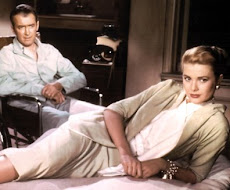_01.jpg)





